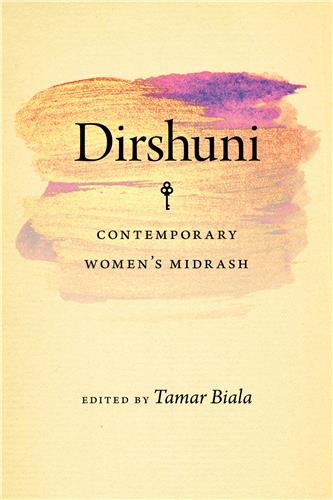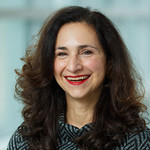Happy Anniversary to HBI: A Message from the Director
Sept. 8, 2022
By Dr. Lisa Fishbayn Joffe
Twenty-five years ago, in a small office at Brandeis, the Hadassah-Brandeis Institute opened its doors to a single scholar, published one book, and gave out 20 HBI Research Awards.
Today, we have more than 60 books still in print, publish a leading journal and have hosted hundreds of scholars, interns, artists, and authors, and funded research all over the world. Most importantly, we are a crucial collaborator in the field of Jewish women's and gender studies, making important contributions that have supported generations of innovative scholarship by and about Jewish women. Our work also finds its way into popular culture through best-selling books, major museum exhibitions and an upcoming major motion picture.
Former HBI interns and research assistants are now Jewish studies experts, Jewish clergy and Jewish communal leaders, helping to forge a more inclusive Judais. HBI scholars and artists create new interpretations of identity and belonging from the perspectives of women, LGBTQ and non-binary people, inspiring individuals from all backgrounds to find their own authentic place in Jewish history and peoplehood.
That's why I am so proud to celebrate HBI's contributions and to host a lineup of programs and scholars, artists, and authors that will continue to highlight the importance of HBI's work and build on our legacy into the next 25 years. This year, we will share new research, new books and new solutions to some of the most challenging issues we face in terms of reproductive rights and domestic violence.
We will continue to work collaboratively with our campus and community partners. Please visit our current art exhibition in the Kniznick Gallery, Seven Species, Three Generations," before it closes Sept 15. The show, which is rich with meaning, gorgeous, and appealing to all the senses, is the product of a collaboration between the Schön family of artists, who clearly take such joy and find so much inspiration for their work in each other, the Women's Studies Research Center and CJP. The mission of HBI, and of Jewish Studies at Brandeis more broadly, is to produce and share new knowledge about Jewish life, traditions and texts. This show is a wonderful example of this, using the frameworks of gender, family relationships and art to find new meanings in these ritual foods and objects. It received rave reviews in The Boston Globe and JewishBoston.com
Please join us Sept. 8 for a virtual program to learn about all the artists in the "Seven Species, Three Generations" exhibition. You will have an opportunity to see images of the art and hear the stories behind it in the panel moderated by Adele Fleet Bacow.
Our opening session of the Sandra Seltzer Silberman Conversations Series will take place on September 14, featuring HBI Scholar in Residence Rachel Barenbaum discussing her new book, "Atomic Anna," a gripping read and powerful exploration of Jewish women’s lives in the former Soviet Union and as immigrants to America. It also deals with challenging relationships between mothers and daughters, spiced with discussions of nuclear disaster and time travel. It received a well-deserved positive review in the The New York Times.
 On Oct. 18, HBI Research Associate Tamar Biala will join us for the online launch of her book "Dirshuni: Contemporary Women's Midrash," the newest publication in the HBI Series on Jewish Women from Brandeis University Press. This collection of contemporary women's midrash, combining classical literary forms with feminist insights on topics ranging from re-interpreting women's stories in the Torah to reproductive decision-making to responding to domestic violence, has been praised as a "unique and transformative" contribution to the Jewish canon. Read reviews from The Jewish Book Council, the Association of Jewish Libraries and The Jerusalem Post. We look forward to welcoming Biala in person for events later in the fall.
On Oct. 18, HBI Research Associate Tamar Biala will join us for the online launch of her book "Dirshuni: Contemporary Women's Midrash," the newest publication in the HBI Series on Jewish Women from Brandeis University Press. This collection of contemporary women's midrash, combining classical literary forms with feminist insights on topics ranging from re-interpreting women's stories in the Torah to reproductive decision-making to responding to domestic violence, has been praised as a "unique and transformative" contribution to the Jewish canon. Read reviews from The Jewish Book Council, the Association of Jewish Libraries and The Jerusalem Post. We look forward to welcoming Biala in person for events later in the fall.
On Oct. 26, we will welcome HBI Scholar in Residence, Professor Max Strassfeld, speaking on their new book "Trans Talmud: Androgynes and Eunuchs in Rabbinic Literature," which explores ways that Jewish texts understand non-binary and intersex individuals and considers how these insights might guide responses to contemporary legal and ethical struggles for equality.
We welcome a cohort of new and continuing in- person hybrid, scholars in residence. In addition to Professor Strassfeld and Ms. Barenbaum, Dr. Shula Mola will begin her yearlong visit during which she will produce an oral history of the women of Enkash, focusing on the phenomena of the Zar and the Mergem Gojo (blood hut) as spaces for resistance to patriarchal oppression in the Israeli-Ethiopian community.
Professor Michal Raucher will join us to work on her new book "The New Rabbis," which follows the career paths of women ordained to the Orthodox rabbinate and considers how their work is changing our understanding of what constitutes religious authority.
Jewish law and tradition affirms a range of approaches to reproductive decision-making that are not reflected in the recent Supreme Court decision in Dobbs vs. Jackson Women’s Health. Even the most restrictive interpretations of Jewish law identify situations, where the mother's life or health are at risk, abortion is not merely permitted but must be performed as mandatory religious duty (mitzvah) to save the mother's life. Other widely adopted ideals within the Jewish community affirm the right to choose abortion for all pregnant people in ways that work best for their lives and their family circumstances. HBI Scholar in Residence Professor Sara Ronis will be spending her term with us studying how rabbinic discussions of the status of the fetus in various contexts shape the construction of notions of personhood. Our spring art show in the Kniznick Gallery will continue this theme, exploring the relationship between religion and reproductive rights through the work of a diverse group of artists reflecting on Jewish texts.
All of this work is made possible by financial support from donors and friends. Contributions of any size help to fund research positions, research awards, student internships, and public programs. I am grateful to all our supporters, including more than 110 people who became Friends of HBI last year. I invite you to renew your support or become a new Friend of HBI this year by making a sustaining annual gift of $180 or more. To discuss gifts in honor of our 25th anniversary, please contact Amy Powell.
I hope to see you at these events online and in person. Please join us and feel free to spread the word about our work. Become a Friend of HBI.
Warmly,
Dr. Lisa Fishbayn Joffe
 Dr. Lisa Fishbayn Joffe is the Shulamit Reinharz Director of the Hadassah-Brandeis Institute.
Dr. Lisa Fishbayn Joffe is the Shulamit Reinharz Director of the Hadassah-Brandeis Institute.